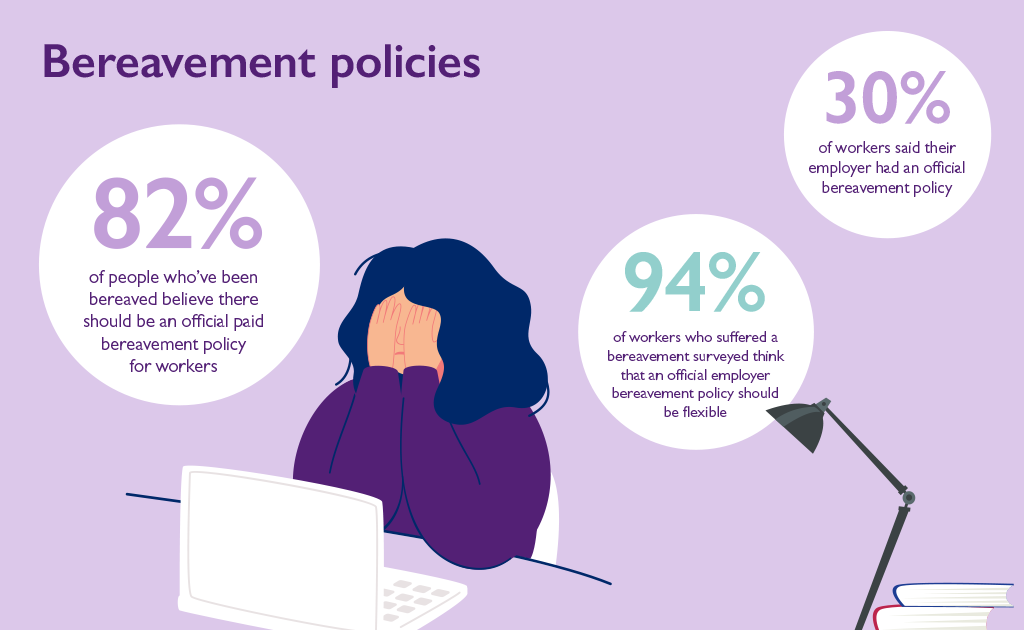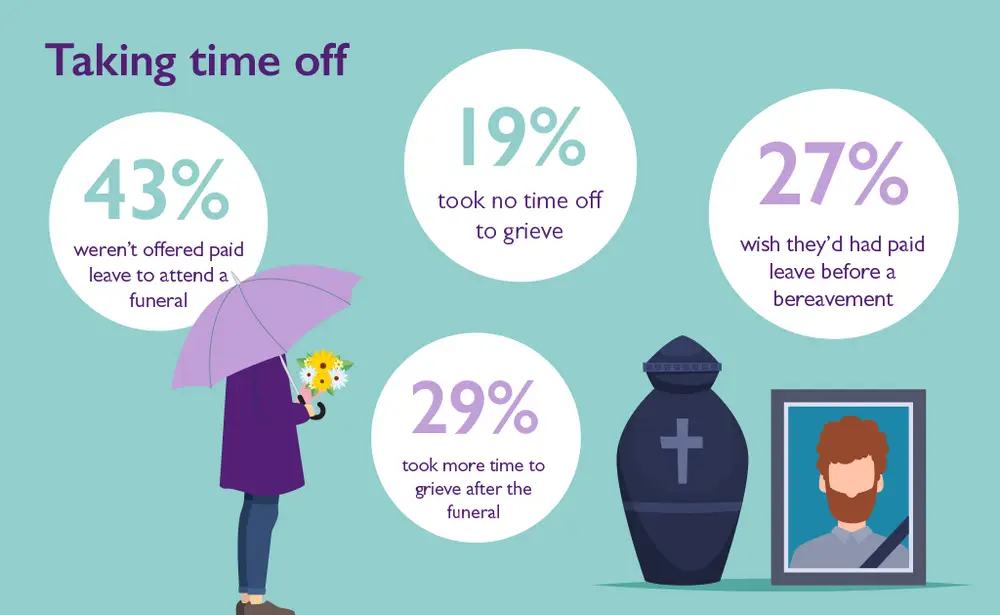In the UK, it is not surprising that more than three quarters of people have suffered a bereavement in their lifetime.
Even though this statistic of 75% could lead you to believe that death and dying, by its very nature, is commonplace, we witness unique and often remarkable responses to grief from the families who we support at this particularly difficult time. It is this first-hand experience, together with our rich history as funeral directors that we can draw on, which means we can genuinely raise concerns that in this country we could be doing a little more to support our workforce when they are bereaved.
In some recent research we have undertaken, we have been surprised by the lack of support that UK workers are receiving at the time of a bereavement. Some headline statistics showed:
- 22% of Brits felt they were not granted enough time off to grieve
- 43% were not offered paid leave to attend a funeral
- 19% took no time off to grieve at all following the death of a loved one
These numbers reflect a country which may not be going far enough to address the grief of the nation as and when it emerges.
The arbitrary nature of the emotions of grief, so often deeply felt and unpredictable, should be enough to coerce businesses into taking a more rounded view of their policies, by assessing what steps could be taken to nudge bereavement a little higher up the HR agenda. Our recent discussions with Stacey Heale and Flora Baker highlight the very personal nature of grief.
This has motivated us to launch a campaign in which we are encouraging all businesses to introduce flexible, paid bereavement policies and initiate real change in this country for their workers.
This is our #PaidLeavetoGrieve campaign, and a petition to take this topic further is available to sign, to lobby all parties to commit to tabling an amendment bill within their 2024 manifesto.
But first here is the back story which supports it:
Grief in the workplace
Currently there is no legal requirement for a UK company to have a policy in place to cover compassionate or bereavement leave. Many companies do however offer support for employees who request leave for their recent bereavement and will agree to some form of leave, but this can often be granted on a case-by-case basis.
The lack of guidelines or policies in place can leave employees vulnerable and open to inconsistencies, or oversights, which can equally lead to uncertainty on both sides, or even employee grievances. The effects of a bereavement can be highly distracting and make focusing on one’s job extremely difficult. Employers need to be mindful that there is no timeline with grief. It is up and down, and therefore requires genuine flexibility on behalf of the employer, who, by addressing their employee’s grief experience, can be a valuable professional force for good in this arena.
Greater clarity and support would be welcomed by employees
With no statutory or set amount of time for bereavement leave in the UK, the responsibility, for the most part, lies with the employee when seeking leave and endeavouring to explain their reasons.
Time off can be allowed when dealing with an emergency involving a dependent such as a spouse, partner, child or grandchild, or parent including the death of a dependent. However, this does not explicitly cover time off to grieve.
Our research also demonstrated that 94% believe that an official employer’s policy, should one be available, must be flexible, to allow for the fact that everyone’s experience is unique.

Whilst employers are encouraged to allow ‘compassionate leave’ when the appropriate cases arise, this can be paid or unpaid and at the employer’s discretion.
The truth of this is that for an employer this can be decidedly ‘grey’. Balancing a desire to give their employee enough time off to deal with their loss, against the impact of prolonged work absences, is also clearly to be considered.
Since April 2020, as a welcome step forward, Parental Bereavement Leave (or Jack’s Law) entitles employed parents or primary carers to two weeks’ paid time off, should a dependent child under the age of 18 die. This can be taken as a fortnight or be arranged over two separate weeks, up to 56 days after the child has died or is stillborn after 24 weeks of pregnancy.
The statutory Parental Bereavement Leave and Pay payment for 2022/23 is £156.66 per week, or no less than 90 per cent of the bereaved person’s average weekly wage (whichever is lower).
There are rules for giving notice to enact Bereavement Leave depending on how much time has passed since the child’s death, and further rules around when the leave must start and end. This level of clarity and support is long overdue, and much appreciated by families who we support, and who fall into this very sad and distressing position.
Paid Leave to Grieve
We are proud to open up the conversation around grief and as demonstrated in our deeply moving, short film, most people do need flexibility and understanding around the unpredictability of grief.
For more information on how you can support #PaidLeaveToGrieve and to view helpful guidance in our employer’s pack, or to sign our petition which would raise the topic further up the agenda, please visit our Paid Leave to Grieve page.
